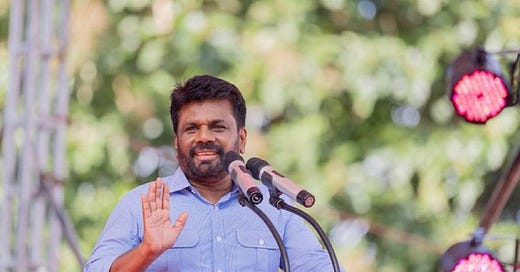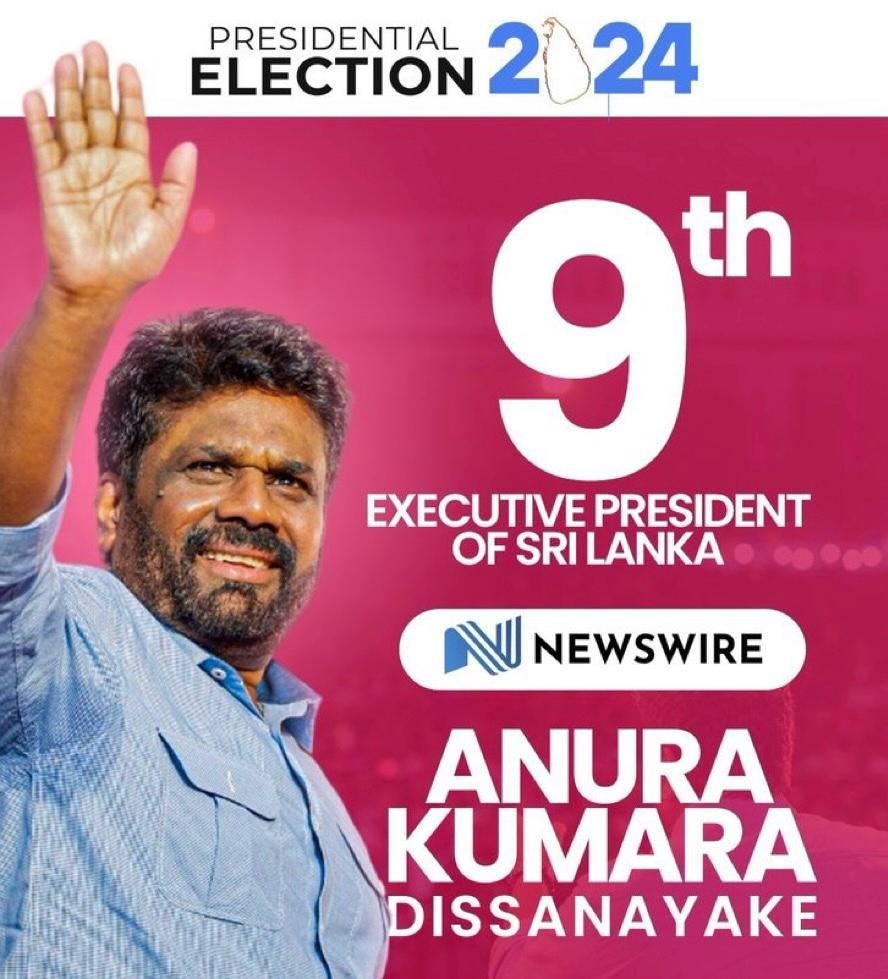Change of Guard in Sri Lanka: Anura Kumara Dissanayake Wins the Presidential Election
Much like its outreach to the Maldives after the election of a seemingly anti-India President, India would be wise to extend a helping hand and an olive branch to the new Sri Lankan President.
Breaking News: Left-Wing Leader Anura Kumara Dissanayake Wins 2024 Sri Lankan Presidential Election
Colombo, 22 September 2024 – In a historic and dramatic victory, Anura Kumara Dissanayake has secured the presidency in Sri Lanka's 2024 election, marking a decisive change of guard in the nation's political landscape. As the leader of the National People's Power (NPP) alliance, spearheaded by the Marxist-Leninist Janatha Vimukthi Peramuna (JVP), Dissanayake garnered 42.31% of the vote. This remarkable surge comes for a party that captured just 3.84% in the 2020 general elections, underscoring a major shift in Sri Lanka's political direction towards left-of-centre politics.
A Major Shift in Sri Lanka’s Political Landscape
The election of Anura Kumara Dissanayake as Sri Lanka’s new President marks a profound political transformation for the nation. As the leader of the left-leaning National People’s Power (NPP) alliance, Dissanayake brings a fresh ideological perspective, starkly different from the policies of previous administrations. His victory follows the presidency of Ranil Wickremesinghe of the United National Party (UNP), who had assumed office in July 2022 after Gotabaya Rajapaksa’s resignation amidst mass protests and economic instability. At the time, Wickremesinghe was serving as Prime Minister in a turbulent political environment. The NPP’s success represents a dramatic shift from the traditional dominance of established parties, especially considering that the NPP secured just 3.84% of the vote in the 2020 parliamentary elections. This result underscores the rising popular support for a left-wing, populist platform focused on addressing working-class concerns, in stark contrast to the more centrist and conservative forces that have historically governed Sri Lanka.
Background
The election, held on 21 September 2024, came in the wake of a tumultuous political upheaval in Sri Lanka. The crisis in 2022 led to the ousting of then-President Gotabaya Rajapaksa, who fled the country amidst nationwide protests over economic mismanagement. Ranil Wickremesinghe, who had been appointed as Prime Minister by Rajapaksa, assumed the presidency in July 2022 through a parliamentary vote, with his term set to expire in November 2024.
Election Results and Candidates
Key contenders in the election included incumbent President Ranil Wickremesinghe, opposition leader Sajith Premadasa, and Anura Kumara Dissanayake. Dissanayake’s victory marks a transformative moment for the country, reflecting voter disillusionment with traditional political powerhouses. Premadasa came in second, while Wickremesinghe trailed as a poor third, signifying a sharp rejection of the status quo.
Who is Anura Kumara Dissanayake?
Anura Kumara Dissanayake, 55, leads the Marxist-Leninist Janatha Vimukthi Peramuna (JVP) and spearheads the NPP alliance. His political ascent was fuelled by his role in the 2022 protests that brought down the Rajapaksa regime. Unlike previous Sri Lankan leaders, Dissanayake is not part of the Rajapaksa family, whose members have dominated the political landscape for decades. His leadership is seen as a break from the past, resonating with a population tired of entrenched political dynasties.
Implications for International Relations
Dissanayake’s victory is expected to have a profound impact on Sri Lanka's relationships with its key regional partners, India and China.
India
Historically, Dissanayake’s Janatha Vimukthi Peramuna (JVP) maintained a critical stance towards India. However, his February 2024 visit to New Delhi, at the invitation of the Indian government, indicated a softening of this stance. His government is likely to seek closer economic and strategic ties with India, as both countries navigate regional challenges and opportunities.
China
Dissanayake’s Marxist-Leninist ideology might suggest an affinity for China, yet he has consistently advocated for a nonaligned foreign policy. Balancing relations with both India and China will be key as he aims to steer Sri Lanka’s foreign policy towards a more pragmatic approach focused on national interests rather than ideology.
Focus on Economic Recovery
Sri Lanka continues to reel from the economic crises that sparked mass protests in 2022. Dissanayake campaigned on a platform of economic reform, prioritising solutions to the nation’s pressing issues of inflation and poverty. His administration is expected to focus heavily on economic recovery, likely through both domestic reforms and increased international cooperation, particularly with India and China, which have made significant investments in the country.
Flashback: The End of the Sri Lankan Civil War
The Sri Lankan Civil War, which spanned 26 years, reached a dramatic conclusion in May 2009. The conflict, primarily between the Sri Lankan government and the Liberation Tigers of Tamil Eelam (LTTE), was driven by the LTTE's demand for an independent Tamil state. A turning point came in 2006 when the government launched a major military offensive, breaking a 2002 ceasefire agreement. Between 2007 and 2009, the Sri Lankan military successfully recaptured large territories in the north and east that had been under LTTE control. By early 2009, the LTTE was confined to a small coastal region in northeastern Sri Lanka.
The LTTE, known for its violent tactics, including suicide bombings and political assassinations, was responsible for the assassination of former Indian Prime Minister Rajiv Gandhi in 1991. The killing was orchestrated by LTTE operatives as retaliation for India's involvement in the Sri Lankan conflict, specifically the deployment of the Indian Peace Keeping Force (IPKF) in the late 1980s. The IPKF had been sent to enforce peace between the government and the LTTE but ended up clashing with the latter, leading to deep resentment.
In May 2009, the Sri Lankan government declared victory after the killing of LTTE leader Velupillai Prabhakaran, marking the official end of the war on May 19, when the LTTE admitted defeat. While the military defeat of the LTTE brought an end to the violence, the government has faced ongoing criticism for human rights violations and has struggled to address the deep-rooted ethnic tensions that remain. Post-war Sri Lanka continues to grapple with issues of reconciliation, political representation, and economic development, especially for the Tamil minority.
The Janatha Vimukthi Peramuna (JVP), once a revolutionary Marxist group known for its own insurrections in the 1970s and 1980s, had by the 2000s transformed into a mainstream political party, though it did not play a significant role in the final phase of the civil war.
A New Era in Sri Lankan Politics
The election of Anura Kumara Dissanayake represents a pivotal moment in Sri Lanka's political landscape. As the new President, Dissanayake is set to reshape the country's domestic policies and international relations. Sri Lanka, struggling to recover from prolonged economic challenges, now enters a critical phase under a leader from the left-wing Janatha Vimukthi Peramuna (JVP), a party with deep roots in Marxist-Leninist ideology. His presidency offers a sharp contrast to the centre-right governments that have traditionally governed the country, and the key question will be how Dissanayake balances the JVP’s socialist principles with the practical realities of governance, particularly in managing Sri Lanka’s international relations and economic revival.
a.) Sri Lanka's Position in the China-India Equation
While the JVP has traditionally leaned towards China, given its ideological alignment with Beijing's model of state-led economic development, the situation is far more complex. China’s "string of pearls" strategy, which seeks to encircle India through alliances with neighbouring countries, has made Sri Lanka a critical player in the region. Chinese investments in key infrastructure projects, such as the Hambantota Port, have already positioned the island nation within Beijing’s strategic orbit. Although a natural alignment with China might seem plausible for Dissanayake’s government, this carries the risk of increasing Sri Lanka's dependency on China—a risk that could be detrimental to its long-term economic recovery and sovereignty.
b.) India’s Role: Pragmatic Engagement
For India, led by the right-wing BJP under the National Democratic Alliance (NDA), this moment presents both challenges and opportunities. Much like its outreach to the Maldives after the election of a seemingly anti-India president, India would be wise to extend a helping hand and an olive branch to Sri Lanka. Despite ideological differences, offering pragmatic and constructive support to Dissanayake’s administration could foster mutual benefit. India’s strategic interests lie in ensuring that its smaller neighbours do not fall entirely under China's influence. By extending economic assistance, investments, and cooperation, India could play a crucial role in Sri Lanka’s recovery while countering China's growing presence in the region.
c.) A Path Towards Regional Stability
Such an approach would be both practical and progressive. By supporting Sri Lanka during this critical period, India can maintain a balanced geopolitical position in the region, preventing Sri Lanka from becoming overly reliant on China. Additionally, extending a cooperative hand to Dissanayake would demonstrate India’s willingness to engage with diverse political ideologies, enhancing its role as a stabilising force in South Asia. This pragmatic diplomacy could not only strengthen bilateral ties but also contribute to long-term regional stability, aligning with India’s broader goal of countering Chinese expansionism while fostering strong relations with its immediate neighbours.






……certainly difficult days ahead for Indian Ministry of Foreign Affairs, more so during the ongoing hard time to make balance with Russia and USA…..